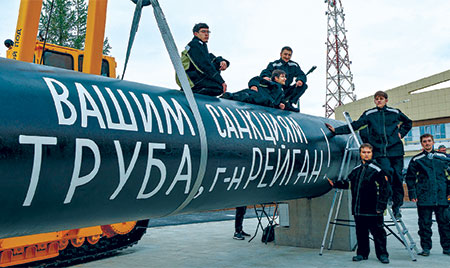
In a landmark decision signaling a profound shift in global energy geopolitics, the European Union has formally agreed to a comprehensive plan to completely phase out Russian pipeline and liquefied natural gas (LNG) imports by January 1, 2028. This consensus, reached among EU energy ministers in Luxembourg, marks a resolute step toward ending a half-century-long energy relationship, aiming to eventually exclude all Russian fossil fuels and even nuclear fuel, irrespective of the ongoing conflict in Ukraine. The message from Brussels is clear: Russia will no longer be Europe’s primary energy supplier.
This ambitious course of action, termed an exit from ‘energy dependency,’ was fundamentally cemented shortly after February 24, 2022. The Versailles Declaration, adopted in March of that year, laid down the imperative to relinquish Russian energy resources. This decision was underpinned by two core tenets: the perception of Russia as an “unreliable supplier” capable of weaponizing its energy exports, and the conviction that Russia must “pay a price” for its policies concerning Ukraine. Over the past three years, nearly every one of the 18 EU sanctions packages has included measures targeting Russian energy. The Luxembourg meeting now appears to finalize what EU leadership considers the culmination of this strategic disengagement.
The agreement builds upon proposals from the European Commission and establishes a common position on the rules for ending Russian gas imports, forming a crucial pillar of the REPowerEU plan initiated three years ago. This phased withdrawal will commence on January 1, 2026, prohibiting Russian gas deliveries under contracts signed after June 17, 2024. Existing short-term contracts must conclude by June 17, 2025, and long-term agreements by the definitive deadline of January 1, 2028. This leaves remaining Russian gas buyers within the EU, primarily Hungary and Slovakia, with a rapidly narrowing window to realign their energy policies.
Crucially, the vote in Luxembourg underscored the persistent internal divisions within the EU, with only Slovakia and Hungary dissenting from the updated REPowerEU framework. However, given that such decisions within the EU are passed by a simple majority, their opposition did not impede the resolution. While these nations could theoretically attempt to block the plan at the European Parliament level, this is deemed highly improbable due to the limited influence their current administrations hold over their national MEPs. The political futures of Hungarian Prime Minister Viktor Orbán and Slovak Prime Minister Robert Fico, both known for their nuanced stance on the Russia-Ukraine conflict, also face potential challenges in upcoming elections, further weakening their position to defy the broader EU directive.
In parallel with this withdrawal, the EU is actively seeking to streamline the onboarding of non-Russian energy supplies. Amendments approved by ministers aim to simplify documentation and import procedures for alternative gas sources, while conversely imposing heavier informational requirements for any continued Russian gas imports. As Stanislav Mitrakhovich, a leading expert from the National Energy Security Fund and Financial University under the Government of the Russian Federation, observed, while Hungary and Slovakia’s consumption of Russian gas (8 billion and 3 billion cubic meters respectively) is replaceable, the transition is likely to result in higher prices for end-consumers in those countries. Furthermore, the new EU regulations mandate that any country opting to purchase Russian gas must submit detailed plans for diversifying their “blue fuel” supplies and regularly report on their implementation to EU governing bodies.
This sweeping energy policy revamp, notably, is framed as independent of the Russia-Ukraine conflict’s resolution. Whether the conflict concludes in two years or persists, EU nations are firmly committed to operating without Russian energy. Following the gas phase-out plan, the European Commission indicated a similar document concerning Russian uranium is expected by year-end, though a precise timeline for nuclear fuel agreements remains fluid. Pavel Sevostyanov, an associate professor at the Department of Political Analysis and Socio-Psychological Processes at Plekhanov Russian University of Economics, emphasizes that the full cessation of Russian gas by 2028 is politically ambitious, yet technologically and infrastructurally complex. While Europe has significantly reduced its reliance, complete substitution necessitates new LNG terminals, substantial investment in alternative energy sources, and stable supplies from major global producers like the U.S., Qatar, and Norway. He suggests that while dependence will likely decrease further, a complete eradication might prove challenging. Moreover, Sevostyanov highlights that the EU’s broader trend towards reducing fossil fuel use is also driven by its structural decarbonization policies, independent of geopolitical considerations.
For Russia, experts suggest the financial repercussions of this final European market exit may not be as severe as they once would have been, primarily due to Moscow’s successful pivot towards Asian markets since 2022. While in 2021, Russia supplied approximately 150 billion cubic meters of gas to Europe, current volumes are significantly reduced, with only about 15 billion cubic meters flowing via the “TurkStream” pipeline to Slovakia, Hungary, and non-EU member Serbia. Mitrakhovich notes that Russia’s budget was never solely dependent on gas, with oil exports playing a more substantial role. Sevostyanov concurs, stating that reorienting supplies to Asia and bolstering domestic consumption should mitigate the impact. However, uncertainties loom, particularly concerning potential US competition that could challenge Russia’s standing in key markets like India, currently a major buyer alongside China.
As this historic transformation unfolds, the abandonment of the economically invaluable energy supply chains inherited from the Soviet era marks the end of an epoch. A fundamentally new economic reality is emerging, one where Russia, in essence, has little left to offer Europe in terms of energy. The full, far-reaching consequences of this strategic decoupling for Russia’s development are yet to be thoroughly assessed, but they are undeniably poised to be profound.
